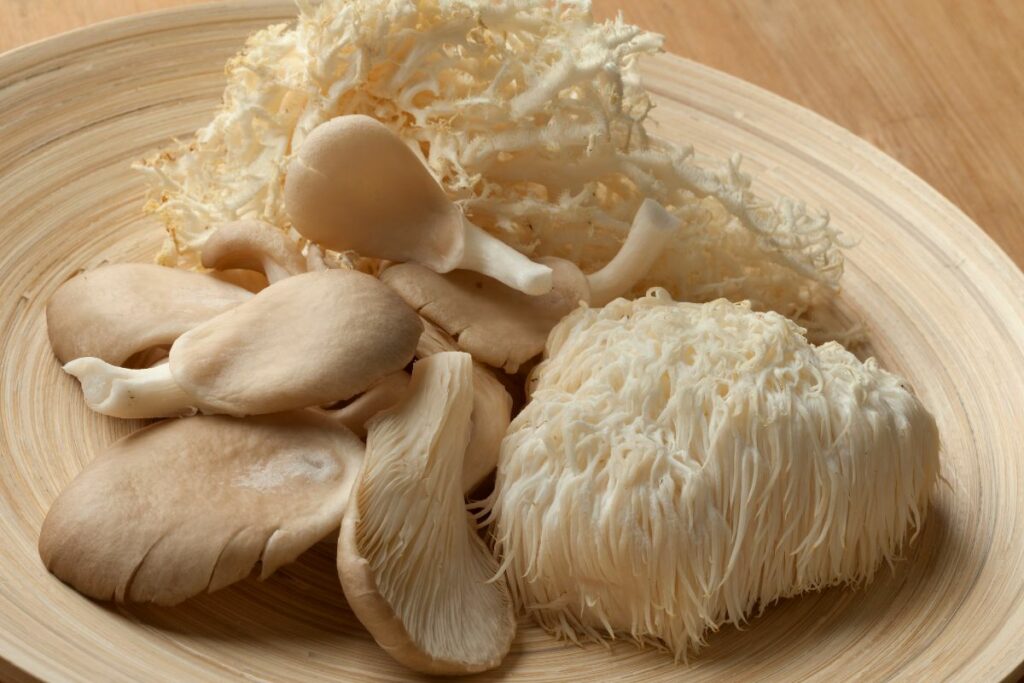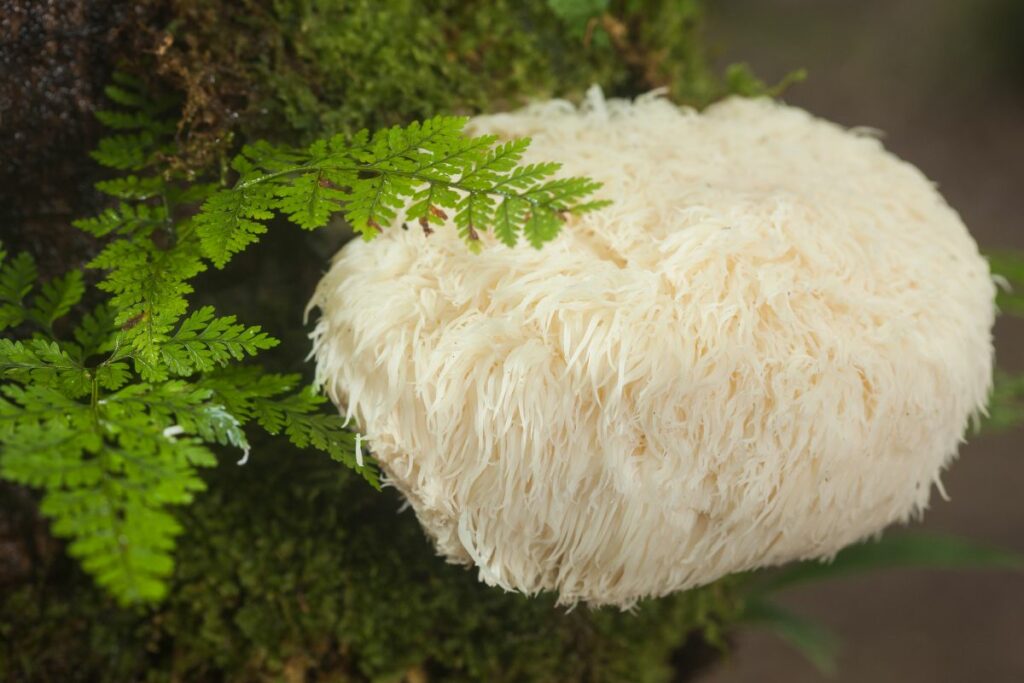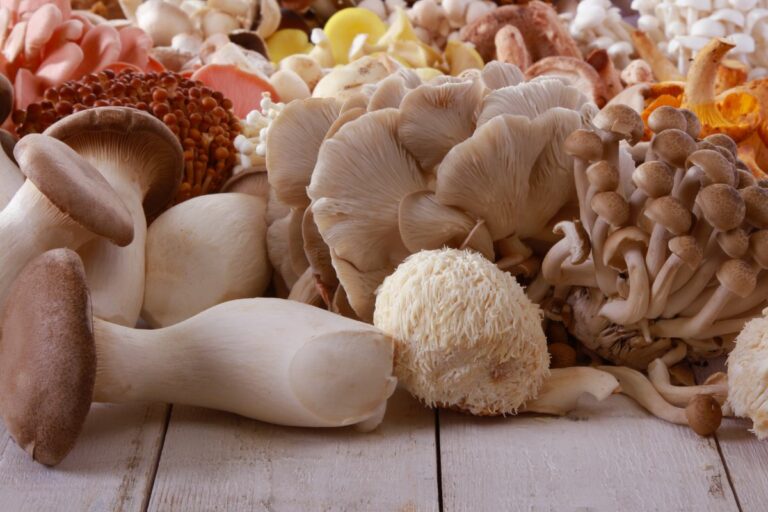Lion’s Mane is a mushroom scientifically known as Hericium erinaceus renowned for its potential to support cognitive function and promote good brain health. Frequently consumed for improving focus, recent research has also suggested that Lion’s Mane may provide benefits for promoting healthy sleep patterns. Incorporating this amazing mushroom into a daily routine might contribute to general well-being and improve overall sleep quality.
Various studies have explored the properties of Lion’s Mane and its potential relationship with enhanced neural functions and regeneration. As a natural, safe, and potentially effective sleep aid, Lion’s Mane has gained the attention of researchers and those seeking alternative solutions for sleep issues. The mechanism behind its sleep-enhancing effects may be closely related to its ability to support healthy brain function and promote neuronal growth.
Considering the importance of sleep in maintaining overall health and the potential benefits Lion’s Mane offers, further investigation and discussion about this mushroom and its potential role in improving sleep quality is warranted. By understanding the properties of Lion’s Mane, one can make informed decisions about incorporating this natural substance into their lifestyle in pursuit of better rest and rejuvenation.
Understanding Lion’s Mane Mushroom
Table of Contents
| Characteristic | Description |
|---|---|
| Scientific Name | Hericium erinaceus |
| Common Names | Lion’s Mane Mushroom, Bearded Tooth Mushroom, Pom Pom Mushroom |
| Appearance | Distinctive white, shaggy, and tooth-like spines resembling a lion’s mane |
| Edibility | Edible and highly prized for its unique taste and texture |
| Culinary Uses | Often sautéed, grilled, or used in soups and stir-fries; likened to seafood in flavor |
| Nutritional Value | Low in calories, rich in protein, dietary fiber, and various vitamins and minerals |
| Medicinal Benefits | Potential for cognitive support, nerve regeneration, immune system enhancement, and anti-inflammatory properties |
| Cultivation | Can be cultivated on hardwood logs, sawdust, or supplemented substrates |
| Traditional Use | Used in traditional Chinese medicine for its potential health benefits |
| Availability | Can be found in the wild, but also available in some markets and as supplements |
Lion’s Mane mushroom, scientifically known as Hericium erinaceus, is a unique medicinal mushroom that has attracted significant attention for its various health benefits. This mushroom is native to Asian countries and has been traditionally used in Chinese and Japanese medicine for its ability to support brain health and improve sleep quality.
The key bioactive compounds found in this mushroom are erinacines and hericenones, which are responsible for its cognitive-enhancing and neuroprotective properties. These compounds are believed to stimulate the production of nerve growth factor, which is essential in maintaining the overall health of neurons and synaptic connections in the brain.
Lion’s Mane mushroom is typically consumed as a dietary supplement or added to a variety of dishes for its nutrition and unique taste. Several studies have demonstrated the potential of this medicinal mushroom in promoting a healthy sleep cycle. For instance, one pilot study conducted on female undergraduate students reported promising results on the use of Hericium erinaceus extracts for improving sleep quality and subjective well-being.
This mushroom has also shown potential in treating neurocognitive impairment and depressive disorders. A case study reported marked improvements in cognitive function and mood of a patient with recurrent depressive disorder after treatment with Lion’s Mane compounds.
The rich nutritional profile of Lion’s Mane mushroom further adds to its appeal, containing a balanced composition of amino acids, proteins, and carbohydrates, as detailed in this study.
In conclusion, Lion’s Mane mushroom stands out as a promising natural remedy for improving sleep quality and cognitive health, thanks to its unique combination of bioactive compounds and long-standing history in traditional medicine. As always, it is essential to consult a healthcare professional before consuming this or any other medicinal mushroom supplement to ensure safety and effectiveness.
Lion’s Mane for Sleep

Lion’s Mane, a unique mushroom known for its cognitive benefits, has also been found to potentially improve sleep quality. This particular mushroom has been used in traditional Chinese medicine for centuries, and modern research is starting to unveil its properties that may help promote restful sleep.
One aspect of Lion’s Mane that contributes to better sleep is its ability to support the nervous system. The mushroom contains compounds that promote nerve growth and regeneration, resulting in a more balanced and well-functioning nervous system. This, in turn, could help regulate the body’s circadian rhythm, which is essential in maintaining sleep patterns and overall sleep quality.
In addition to supporting the nervous system, Lion’s Mane may also address common sleep disorders such as insomnia. Some studies have suggested that this mushroom can help improve sleep patterns and reduce sleep disturbances, making it easier for individuals to fall asleep and stay asleep throughout the night. Although more research is needed, these findings suggest that Lion’s Mane could be a promising natural remedy for sleep-related issues.
Incorporating Lion’s Mane into a nighttime routine might be a valuable addition for those suffering from sleep deprivation. By adding this supplement to a balanced diet, engaging in regular physical activity, and maintaining a consistent sleep schedule, individuals may experience an improvement in their overall sleep quality.
It is important to note that while Lion’s Mane has shown promising results in promoting restful sleep, addressing sleep disorders and issues requires a comprehensive approach that includes lifestyle modifications and, if necessary, guidance from a healthcare professional.
Active Compounds in Lion’s Mane
| Active Compound | Description |
|---|---|
| Hericenones and Erinacines | Bioactive compounds with potential neuroprotective effects |
| Beta-Glucans | Polysaccharides that support the immune system |
| Polysaccharide Peptides | Believed to possess antioxidant properties |
| Nerve Growth Factor (NGF) | A protein that plays a role in nerve regeneration |
| Amino Acids | Essential building blocks for various bodily functions |
| Sterols and Triterpenoids | Potentially contribute to anti-inflammatory properties |
| Polysaccharide-Protein Complex | May have immune-enhancing and anti-tumor properties |
| Anti-inflammatory Compounds | Substances that reduce inflammation in the body |
| Antioxidants | Compounds that combat oxidative stress and free radicals |
Lion’s mane (Hericium erinaceus) is a unique mushroom known for its potential impact on cognitive function and sleep. This is largely attributed to the presence of several bioactive compounds within the mushroom, which include polysaccharides, erinacines, and hericenones, each contributing to its various health benefits.
Polysaccharides are crucial components in lion’s mane, responsible for supporting the immune system and providing anti-inflammatory effects. These complex carbohydrates help maintain overall health and can play a role in improving sleep quality.
Erinacines and hericenones are two groups of compounds that have gained significant attention for their potential effects on brain-derived neurotrophic factor (BDNF). This protein is vital for the growth, development, and maintenance of nerve cells. Improving BDNF levels can lead to enhanced cognitive functions, and in turn, contribute to better sleep patterns.
Erinacines are found in the mycelium of lion’s mane, whereas hericenones are present in the fruiting body of the mushroom. Both compounds have demonstrated the ability to stimulate BDNF production, implying their potential impact on cognitive function and sleep.
One such compound, amycenone, has been recognized for its anti-inflammatory properties and influence on cognitive ability and sleep. Amycenone is a fat-soluble molecule that can potentially improve sleep quality by impacting various mechanisms in the brain.
In summary, lion’s mane contains a range of bioactive compounds, including polysaccharides, erinacines, and hericenones, which contribute to its potential benefits on cognitive function, sleep quality, and overall health. The unique combination of these compounds in lion’s mane makes it an attractive natural supplement for those seeking to improve their sleep and cognitive abilities.
Benefits for Cognitive Function
Lion’s Mane mushroom is known for its potential benefits on cognitive function and overall brain health. This unique fungus has been studied for its positive effects on focus, attention span, and learning abilities. Research has shown that Lion’s Mane may help improve cognitive flexibility, which is essential for adapting to new situations and problem-solving.
The active compounds found in Lion’s Mane, such as erinacines and hericenones, can stimulate the production of nerve growth factor (NGF), a protein responsible for the growth, maintenance, and survival of brain cells. By promoting NGF production, Lion’s Mane may support the development of new neurons and connections, resulting in improved cognitive functions.
In addition to promoting the growth of healthy brain cells, Lion’s Mane has also been found to have neuroprotective properties. This means that it may help protect against age-related cognitive decline and neurological disorders. One study found that Lion’s Mane can potentially slow down the progression of memory loss and reduce the symptoms of Alzheimer’s disease.
Lion’s Mane has also been observed to provide support for mental health disorders. Its positive effect on cognitive function may help individuals suffering from anxiety, depression, and other mood disorders, where impaired cognitive function is often present. The ability of Lion’s Mane to promote brain function may also benefit those with sleep deprivation by improving concentration and working memory, reducing the negative effects of lack of sleep on cognitive performance.
In summary, incorporating Lion’s Mane into one’s diet or supplement routine can provide various cognitive benefits. It may help enhance focus, attention span, learning abilities, and overall brain function. Additionally, its potential neuroprotective properties and positive effects on mental health make Lion’s Mane a promising natural option for supporting cognitive health.
Lion’s Mane and Stress Management

Lion’s Mane mushroom is known for its potential benefits in supporting brain health and cognitive functions. In recent years, it has gained attention for its potential role in stress management and relief of anxiety symptoms. Chronic stress can have detrimental effects on the body, specifically on the adrenal glands and cortisol production. Cortisol is a hormone responsible for regulating mood, and an imbalance can result in issues such as depression and anxiety.
Research has shown that Lion’s Mane may help in reducing the symptoms of stress and anxiety. This mushroom contains compounds that can potentially balance cortisol levels, supporting the adrenal glands and promoting overall mood stability. By doing so, it may help individuals cope better with stressors in their lives, ultimately easing their anxiety and improving mental well-being.
Moreover, Lion’s Mane has been linked to helping with sleep quality and disorders, which can be exacerbated by anxiety and stress. A study conducted on female undergraduate students found that supplementing with Lion’s Mane resulted in improvements in sleep quality and subjective well-being. Adequate sleep is crucial to managing stress levels, as it allows the body to recover and maintain balance.
As stress and depression are often correlated, it’s worth noting that Lion’s Mane may also aid in supporting mental health. Findings from a scientific exploration suggest that the mushroom could be helpful in treating depression by regulating neurotransmitters. Additionally, its inherent properties as an adaptogen, or stress regulator, make Lion’s Mane beneficial in managing depression and anxiety symptoms.
In conclusion, incorporating Lion’s Mane into your daily routine could yield potential benefits in stress management, anxiety relief, and overall mood enhancement. While more extensive research is needed to solidify these findings, the available evidence points to a positive relationship between Lion’s Mane and stress management outcomes.
Health Benefits Beyond Sleep and Cognition
Lion’s mane mushroom (Hericium erinaceus) is renowned for its potential benefits in promoting healthy sleep and cognition. However, this remarkable fungi also possesses a wide range of other health benefits. Here, we explore some of the key areas in which lion’s mane mushroom may contribute to overall physical health and well-being.
- Immune System Support: Lion’s mane has been found to have immune-boosting properties. It contains beta-glucans, which are known for their ability to support a healthy immune system. These compounds may help to strengthen the body’s natural defenses against various illnesses and infections.
- Anti-inflammatory Effects: Inflammation plays a role in the development of many chronic conditions, including heart disease, obesity, and diabetes. Studies have shown that lion’s mane may possess anti-inflammatory properties, potentially helping to reduce the overall inflammatory burden in the body.
- Heart Health: Heart disease remains a leading cause of death worldwide. Lion’s mane has been shown to promote heart health through a variety of mechanisms. It may help to lower cholesterol levels, reduce blood clots, and improve overall blood vessel function. As a result, this potent mushroom may contribute to a reduced risk of developing heart disease.
- Weight Management: Obesity and being overweight are linked to a range of health issues, such as diabetes and heart disease. Some research suggests that lion’s mane might have the potential to assist with weight management. It can potentially influence the expression of genes related to lipid metabolism, leading to lower levels of fat storage.
- Cancer-Fighting Potential: Preliminary studies have indicated that lion’s mane may have anti-cancer properties. The mushroom contains certain bioactive compounds that might inhibit the growth and spread of cancer cells, particularly in cases of gastric, liver, and colon cancers. Further research is needed to confirm these findings, but the results so far are promising.
In conclusion, lion’s mane mushroom goes beyond its well-known benefits for sleep and cognition. Its various properties, such as immune system support, anti-inflammatory effects, and heart health promotion, make it a valuable addition to a holistic health regimen.
Directions for Use and Dosage
Lion’s mane is available in various forms, such as supplements, capsules, powders, and tinctures. It is essential to follow the manufacturer’s guidelines for the appropriate dosage when taking lion’s mane for sleep.
- Capsules are a popular option for lion’s mane supplementation. A common dosage recommendation for capsules is to take two 500 mg capsules per day. Remember to drink a glass of water with the capsules to facilitate digestion.
- Powders can be mixed into smoothies, coffee, or tea, depending on personal preferences. A typical dosage for lion’s mane powder is one to three grams daily. It is advisable to start with a lower amount and gradually increase the dosage as needed to find the optimal amount for each individual.
- Tinctures are another way to consume lion’s mane. They are liquid extracts that can be easily added to a beverage. The recommended dosage for tinctures varies by product, so it is essential to follow the specific label instructions. Generally, it is advised to use 1ml or half a dropper under the tongue or in a beverage, up to three times daily.
When using lion’s mane for sleep, it is recommended to take the supplement approximately one hour before bedtime to allow the natural effects to take place. However, it is essential to remember that individual needs and responses may vary.
Always consult a healthcare professional before starting any new supplement, particularly if you have any pre-existing concerns or conditions. Regular check-ins with a healthcare provider can also help monitor and assess the effectiveness of lion’s mane in improving one’s sleep quality.
Potential Side Effects and Risks
Lion’s mane is generally considered safe for most individuals, but like any natural supplement, there are potential side effects and risks to be aware of. Some common side effects reported by users include gastrointestinal issues such as diarrhea, bloating, or mild stomach cramps1. These side effects are typically temporary and resolve once the body adjusts to the supplement.
While lion’s mane has been found to potentially assist with sleep issues and insomnia, it is crucial to understand the possible risks involved with its use. Combining lion’s mane with sedative medications might cause excessive drowsiness. It is essential to consult with a healthcare professional before using it alongside any medications, particularly sedatives2.
The safety of lion’s mane for pregnant individuals and its potential interactions with other medications are not well studied, so it is advised that pregnant or breastfeeding individuals consult with their healthcare provider before using this supplement3. Additionally, it is essential to be cautious when using supplements, especially if you have known allergies or sensitivity to mushrooms, as an allergic reaction is possible4.
Lion’s mane has shown potential benefits in some studies; however, it is crucial to consider the limitations and the possibility of a placebo effect. Some research studies have been conducted on animals or in vitro, so their findings may not directly translate to human subjects. Further research is needed to fully understand the potential side effects, risks, and interactions of lion’s mane with medications and other health conditions.
Latest Research on Lion’s Mane

Recent studies on Lion’s Mane mushroom (Hericium erinaceus) have explored its potential benefits for sleep, among its various other health-promoting properties. As a traditional Chinese medicine, Lion’s Mane has long been associated with cognitive support, addressing sleep disturbances, anxiety, and even hot flashes 1.
Human studies investigating Lion’s Mane for sleep are limited but suggest promising results. Research indicates that the mushroom’s bioactive compounds, such as erinacines and hericenones, have neuroprotective and nerve growth-promoting effects 2. These compounds may help improve sleep quality by supporting brain function and promoting relaxation.
In terms of efficacy, several animal studies have demonstrated that Lion’s Mane extract can improve sleep duration and quality. For example, one study on mice found that administering Lion’s Mane extract led to a significant increase in non-rapid eye movement (NREM) sleep 3. NREM sleep is essential for restorative sleep, which could potentially benefit humans as well.
Safety is, of course, a crucial consideration when evaluating any supplement. So far, the research indicates that Lion’s Mane is generally safe to consume. In a human study on cognitive function, participants took Lion’s Mane supplements for four months without experiencing any adverse effects 4. However, as with any supplement, it is essential to consult a healthcare professional before using Lion’s Mane for sleep or any other purpose, as individual responses may vary.
While the current research on Lion’s Mane for sleep is promising, more extensive studies involving human participants are necessary to corroborate these findings. With additional research, we may better understand the full potential of this fascinating mushroom for supporting healthy sleep and overall wellness.
Frequently Asked Questions
Does Lion’s Mane improve sleep quality?
Lion’s Mane mushrooms have gained popularity for their potential cognitive benefits. Although there isn’t direct evidence that Lion’s Mane improves sleep quality, its potential benefits on cognitive health may have a positive impact on sleep indirectly.
Can Lion’s Mane reduce anxiety and promote relaxation?
Some studies suggest that Lion’s Mane may help reduce anxiety and promote relaxation. By potentially decreasing anxiety levels, it could indirectly contribute to improved sleep. However, more research is needed to better understand the relationship between Lion’s Mane and anxiety reduction.
How does Lion’s Mane affect cortisol levels?
Lion’s Mane mushrooms have not been directly linked to changes in cortisol levels. Cortisol is a stress hormone that can affect sleep quality. Currently, there is not enough evidence to conclude that Lion’s Mane has a significant impact on cortisol levels.
Is Lion’s Mane tea effective for sleep?
Lion’s Mane tea is an alternative way to consume the mushroom and may offer some of the potential benefits associated with it. However, there is no specific evidence to suggest that Lion’s Mane tea is more effective for sleep than other forms of consumption.
What are the potential effects of combining Lion’s Mane and Reishi for sleep?
Both Lion’s Mane and Reishi mushrooms have potential cognitive and immune system benefits. While combining these two mushrooms may provide additive benefits for overall well-being, there isn’t sufficient evidence to support their combined effectiveness for sleep.
When is the ideal time to consume Lion’s Mane for sleep benefits?
The best time to consume Lion’s Mane for optimal sleep benefits has not been well-established. As with any supplement, it is advised to consult a healthcare professional to determine the ideal time and dosage for individual needs.
Footnotes







